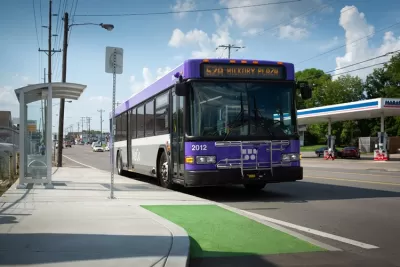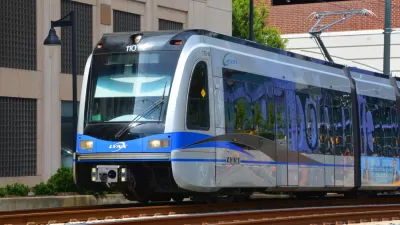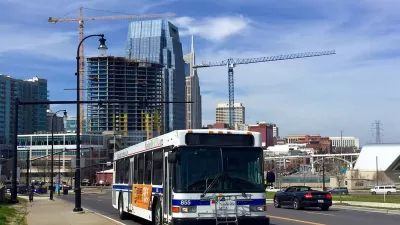The plan will hinge on voter approval of a half-cent sales tax increase on the November ballot.

Nashville Mayor Freddie O’Connell announced a $3.1 billion dollar plan to expand transit in the city. The proposed initiative, called “Choose How You Move,” would be paid for with a half-cent sales tax increase that will appear on the ballot in November, reports Cassandra Stephenson for the Nashville Tennessean.
The majority of the proposed improvements (nearly 60 percent) would come in the form of expanded and enhanced bus service. According to Stephenson, the local WeGo bus service would nearly double under the plan, including the creation of four new express bus routes, as well as updated routes and increased frequency throughout the city. The rest of the plan will add sidewalks, upgrade and add traffic signals, and build new transit centers, as well as create a microtransit pilot and purchase 26 acres of land adjacent to transit center locations to use for things like housing and parks.
The proposed plan comes almost six years after Nashville voters firmly rejected a referendum for a $5.4 billion transit plan and a rebranding of Nashville MTA as WeGo. If voters approve the ballot measure in November, the plan will cost the average Nashville family about $70 more per year in sales tax and take 15 years to complete. The tax increase will cover around 40 percent of the plan’s total cost, writes Stephenson, with the remainder coming from fares, bonds, and state and federal programs. Mayor O’Connell said at a press conference that having a dedicated source of transit funding will make Nashville more competitive for federal grants.
FULL STORY: Nashville's $3.1B transit plan: What's in it and how much it will cost taxpayers

Alabama: Trump Terminates Settlements for Black Communities Harmed By Raw Sewage
Trump deemed the landmark civil rights agreement “illegal DEI and environmental justice policy.”

Study: Maui’s Plan to Convert Vacation Rentals to Long-Term Housing Could Cause Nearly $1 Billion Economic Loss
The plan would reduce visitor accommodation by 25% resulting in 1,900 jobs lost.

Planetizen Federal Action Tracker
A weekly monitor of how Trump’s orders and actions are impacting planners and planning in America.

Waymo Gets Permission to Map SF’s Market Street
If allowed to operate on the traffic-restricted street, Waymo’s autonomous taxis would have a leg up over ride-hailing competitors — and counter the city’s efforts to grow bike and pedestrian on the thoroughfare.

Parklet Symposium Highlights the Success of Shared Spaces
Parklets got a boost during the Covid-19 pandemic, when the concept was translated to outdoor dining programs that offered restaurants a lifeline during the shutdown.

Federal Homelessness Agency Places Entire Staff on Leave
The U.S. Interagency Council on Homelessness is the only federal agency dedicated to preventing and ending homelessness.
Urban Design for Planners 1: Software Tools
This six-course series explores essential urban design concepts using open source software and equips planners with the tools they need to participate fully in the urban design process.
Planning for Universal Design
Learn the tools for implementing Universal Design in planning regulations.
Caltrans
Smith Gee Studio
Institute for Housing and Urban Development Studies (IHS)
City of Grandview
Harvard GSD Executive Education
Toledo-Lucas County Plan Commissions
Salt Lake City
NYU Wagner Graduate School of Public Service





























